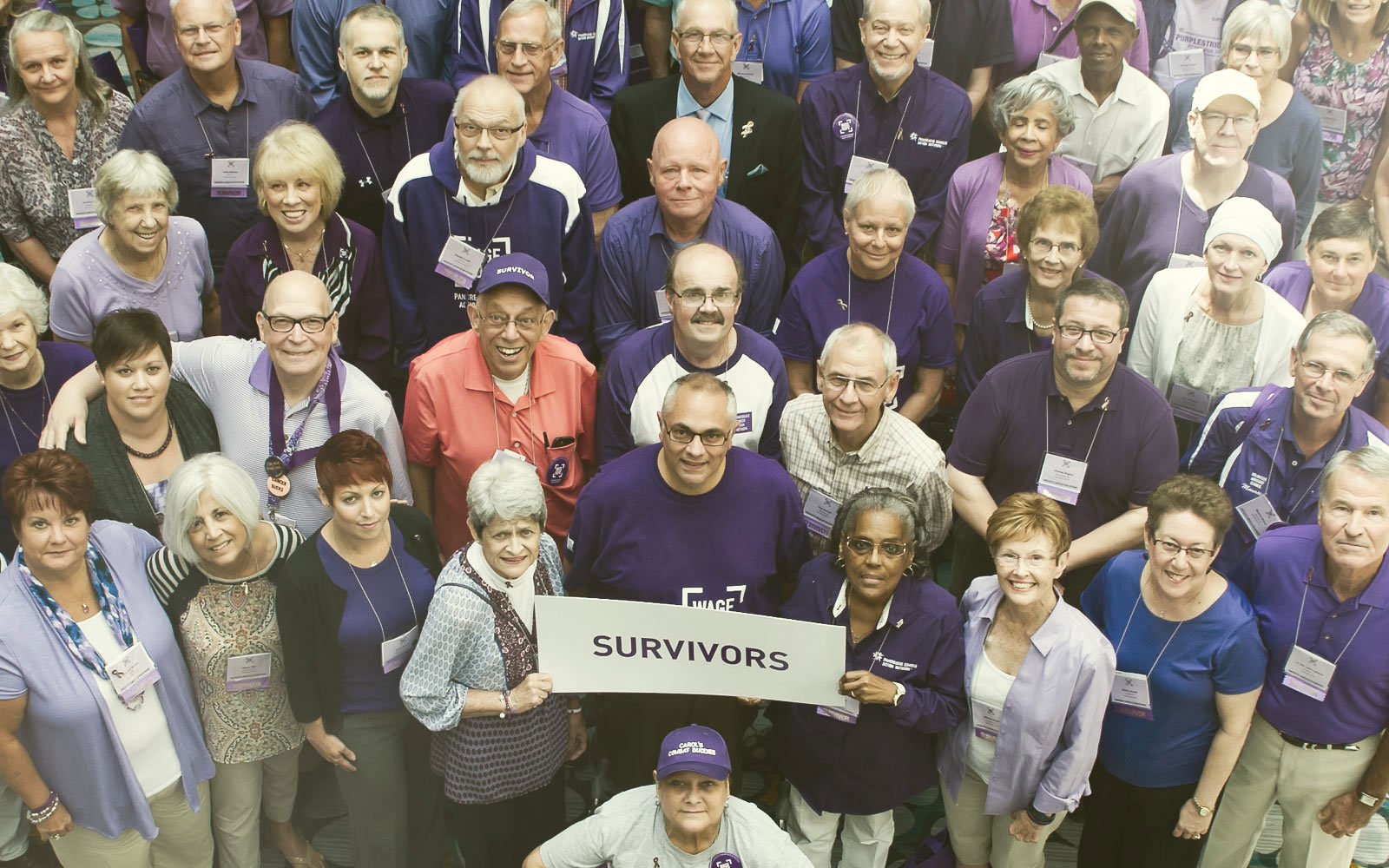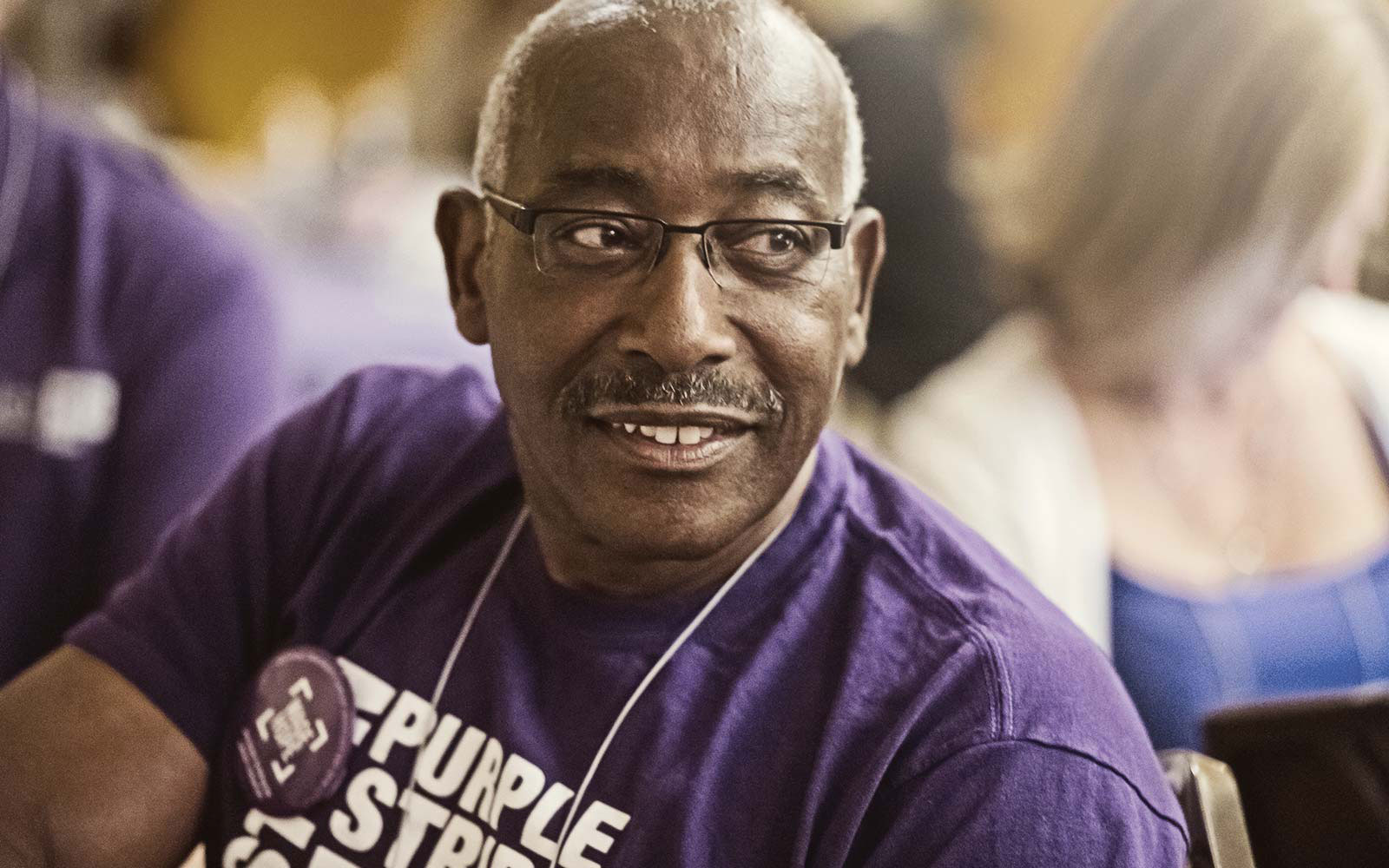




Your unwavering commitment has made a positive impact on the outlook for people fighting pancreatic cancer. The advances you’ve made possible will have far-reaching effects - not just for today, but for tomorrow, too. We simply could not have made it to where we are today without you. We are extremely grateful and beyond inspired by you!
SHARE THIS YEAR’S REPORT



There are many important victories to celebrate from the past year – we’ve achieved a number of major milestones, thanks to your support. And that’s great. But we can’t stop here. There’s so much more we need to do. After all, “action” is our middle name. It’s time to Wage Hope.
It’s time to Wage Hope for more breakthroughs. We are relentlessly exploring revolutionary early detection methods and promising new treatments for pancreatic cancer.
For every $1 we awarded from 2003 to 2013, our grantees secured an average of $8.28 in additional pancreatic cancer research funding.
Our total research investment in FY14-15 was nearly $6.9 million – up 22% over the prior year.
We’re building a robust pancreatic cancer research community – over 95% of Pancreatic Cancer Action Network-funded researchers are staying in the field.
It’s time to Wage Hope for more federal research funding. Our advocates are constantly working to focus the attention of Congress on pancreatic cancer and increase the allocation of research dollars for our cause.
More than 550 people attended Advocacy Day – 100 more than in the prior year.
Congress received 28,935 messages from nearly 8,000 Pancreatic Cancer Action Network advocates.
We’ve boosted National Cancer Institute funding for pancreatic cancer by 500% since starting our efforts in 1999.
It’s time to Wage Hope for more knowledge. Our Patient Central Associates help patients and their families by providing highly personalized assistance and vital information about the disease, treatment options – including clinical trial searches from the largest clinical trials database in the country – and so much more.
We’re celebrating our 100,000th contact to Patient Central since 2002, assisting more pancreatic cancer patients and families annually than any single institution in the world.
We launched our Know Your TumorSM personalized medicine service and enrolled 350 patients, providing them with more information to make informed decisions.
Clinical trial searches have increased by 82% over the last three years, thanks in part to the launch of our online Clinical Trial Finder this year.
It’s time to Wage Hope for more awareness. Our army of devoted volunteers works tirelessly to raise awareness of pancreatic cancer, recruit more people to join our cause, and support our national PurpleStride and PurpleLight events.
Volunteers gave over 134,000 hours of their time to our cause.
Corporate and community teams raised more than $10.4 million – up 13% over the prior year.
PurpleStride events raised $12.7 million net – up 13.2% over the prior year.
We introduced our new rallying cry, Wage Hope.
For the 11th year in a row, we received Charity Navigator’s four-star rating for sound fiscal management and transparency. Only 1% of the charities rated by Charity Navigator have received 11 consecutive four-star evaluations.
We co-chaired and helped launch the first World Pancreatic Cancer Day to raise awareness globally for the disease. Some 30 pancreatic cancer organizations in more than 20 countries participated.
Our accomplishments demonstrate that we’re making progress toward our goal of doubling survival by 2020. But there are still challenges we must overcome to ensure that we keep forging ahead. We have an aggressive plan to combat these challenges with even greater urgency.
There aren’t enough researchers and resources. The brightest minds are attracted to difficult challenges, but they need money to develop innovative solutions. We will continue to ensure that pancreatic cancer research receives increased private and federal funding.
The clinical trial enrollment rate is too low. Only 4.5% of pancreatic cancer patients enroll in clinical trials, slowing progress toward new diagnostic tools and treatments. We will work to increase the clinical trial enrollment rate by continuing to inform patients about their options.
Trials don’t match what patients need. Clinical research doesn’t take into account the heterogeneity of pancreatic cancer patients and their tumors. We promote running “smart” clinical trials by providing information through our innovative services like Know Your TumorSM, and driving clinical trials that are based on the needs of real patients.
Some 80% of patients are treated by physicians who may only see a few pancreatic cancer patients a year. We will identify and share best practices in care and treatment with physicians and other healthcare professionals across the country.
Pancreatic cancer is one of the deadliest cancers, yet not enough people are taking action to change it. We’ll continue to heighten public awareness and visibility by growing our strong volunteer network that raises awareness and support.
There aren’t enough researchers and resources. The brightest minds are attracted to difficult challenges, but they need money to develop innovative solutions. We will continue to ensure that pancreatic cancer research receives increased private and federal funding.
Trials don’t match what patients need. Clinical research doesn’t take into account the heterogeneity of pancreatic cancer patients and their tumors. We promote running “smart” clinical trials by providing information through our innovative services like Know Your TumorSM, and driving clinical trials that are based on the needs of real patients.
Pancreatic cancer is one of the deadliest cancers, yet not enough people are taking action to change it. We’ll continue to heighten public awareness and visibility by growing our strong volunteer network that raises awareness and support.
The clinical trial enrollment rate is too low. Only 4.5% of pancreatic cancer patients enroll in clinical trials, slowing progress toward new diagnostic tools and treatments. We will work to increase the clinical trial enrollment rate by continuing to inform patients about their options.
Some 80% of patients are treated by physicians who may only see a few pancreatic cancer patients a year. We will identify and share best practices in care and treatment with physicians and other healthcare professionals across the country.
We’re rewriting the book on how to fight a deadly disease. And you play a vital role in the story of our continued success. Together, we’re able to do so much more.
We have a new goal to raise $200 million over the next five years to significantly increase our investment in groundbreaking research and clinical care that can improve patient outcomes. We need you to be part of the next chapter. Your support will make a big difference, not only today, but for future generations. And there are many ways you can do that:
Join us by participating in local events to raise awareness and generate critical donations. When we all come together, we are more powerful!
Elevate our cause to new heights by raising your voice, spreading the word in your community and educating Congress. With all of us speaking out, we will be heard.
Support our $200 million five-year fundraising goal. Wage Hope through your generosity, and in turn, create a brighter future for patients and families. Together, we will change the course of history for pancreatic cancer.
With deepest gratitude to everyone who made an investment in the future of pancreatic cancer patients this past year.
We were especially honored to receive the largest gift in our history – an extraordinary $15 million donation to honor the memory of visionary entrepreneur and philanthropist Skip Viragh, who died of pancreatic cancer in 2003. This generous gift supports our $200 million five-year fundraising goal that will help us accelerate progress.















